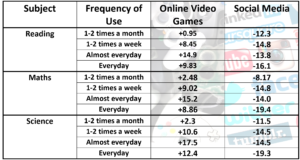Video games improve educational attainment but the crucial question is ‘Why?’
2nd September 2016
New research has found a direct relationship between video games and educational performance. An Australian study found that students who played video games scored more highly in maths, reading and science tests. The study also found that students who spend time on social media perform less well, indicating that the relationship is not simply related to ‘online time’ but potentially something specific to gaming itself. So why would playing video games – a pastime with a bad reputation for increasing violence or antisocial behaviour, have a positive effect on educational attainment? So far, our understanding of the causality of the relationship is poor however there are some interesting theories as to why it exists which may even point to a causal relationship
The recent Australian study found that students who played online video games from a few times a month up to everyday scored significantly higher in reading, maths and science PISA tests, which are specifically designed to test students’ understanding and their ability to apply learning to real life problems.

However, the research has not proven a causal relationship between gaming and education and various other factors could affect the interaction, for example, academically capable children may tend to be more likely to enjoy video games than their peers who are less academic. Yet there are four main reasons for believing there could be an underlying causal relationship:The study also showed that whilst playing video games everyday was linked to better attainment the improvement was less than that for gaming ‘almost everyday’, suggesting that some gaming can be beneficial but that excessive gaming can be detrimental to education, possibly because of the time cost of gaming every day resulting in lost study time.
- Stimulation of interest and curiosity: themed video games bring science and history to life and encourage children to engage with these topics outside of the games themselves. Players may even gain extensive knowledge about particular topics from a themed game. One study found children’s knowledge of history and the evolution of science and industry had increased considerably through playing a game which requires player to build their own civilization but was not a game created for educational purposes.
- ‘Learning to learn’– A term coined in 1949 which means “the process of developing skills that facilitate learning in other contexts”. When playing video games students develop and sharpen skills such as problem solving, maths computation and working memory which then advantage them in their academic lives. Studies have found that developing these skills affects brain development: subjects trained in a video game for two months showed an increase in brain volume in regions of the brain that are responsible for ‘executive functions’ such as problem solving, attention and memory, all of which are vital in education. Although psychological training and testing research has consistently found an effect called ‘similarity specificity’, where training on a task does not transfer to other tasks even those that are very similar, video game training and the consequential improved performance on various tasks does not appear to be subject to this “curse of specificity”.
- Practice makes perfect–: video games require players to hold large amount of information in mind, pay attention to multiple stimuli, whilst taking in new information, making rapid decisions and adjusting responses on the basis of outcomes, pupils have to do the same whilst in school and some researchers suggest that practicing these skills in video games improve individuals’ ability in real life applications of these skills. Games also involve reading, maths and problem solving skills and therefore gaming time could count as study time. A particularly impressive study found that by improving the attention ability of dyslexic children with just 12 hours of action video game play (a game with a physical reaction time challenge) improves the reading ability of dyslexic children more than a years’ worth of dyslexia intervention even though the game involved no specific reading training.
- Improved social skills and communication- despite concerns that video games are anti-social, online games are often multiplayer and involved collaboration, communication, teamwork and even leadership. Developing these skills is necessary for success in education systems like ours which place high demands on pupils’ communication skills and often favour group work. Furthermore, research has found that games which require some sort of pro-social actions such as aiding teammates or caring for characters, encourage pro-social behaviour in real life. This supports the idea that social learning in gaming can be transferred to real life.
Combining this latest Australian study with previous research raises the possibility that there could indeed be a causal relationship between video games and educational attainment. If future research can prove a causal link, and more importantly, improve our understanding of the link, it could have widespread implications for education, parenting and the future reputation of video games.

Comments